For the past year, faculty and students at the College of Charleston have been busy interpreting the South and making our knowledge available to students and the general public.
Course Offerings and Our Program of Study
Southern Studies Courses Available for Race, Equity, and Inclusion requirement: The College has adopted a new graduation requirement, following several years of study, discussion and strong support by many students and faculty: 2 courses in Race, Equity, and Inclusion (REI) for all students beginning F 23 or later. Among the many courses students may complete to fulfill a required course in REI–U. S. Contexts are SOST 200, HONS 172, ENGL/SOST 241, and other courses that count for the minor in Southern Studies. Other F 23 courses that count for REI and also for SOST include AAST 300, AAST 340, and ENGL 313. The REI program is directed by Simon Lewis (ENGL), who is organizing training and support for faculty who teach REI courses or add new courses to the available offerings.
Changes to the SOST minor requirements make it easier for students to complete the minor. They may complete their capstone experience via several options, including individual enrollments (SOST 399, SOST 404, or approved coursework in other departments). The SOST program will continue its practice of sharing completed capstone projects with the public, so that our region can benefit from our students’ interdisciplinary learning and their insights on our diverse and dynamic region.
Presentations and Resources
New Libguide: With the support of other students and faculty, the Program in Southern Studies created a new Libguide, Exploring the Indigenous South, a resource for anyone interested in the past and present experiences of Native Americans in our region.

This Libguide was inspired by the capstone project of Southern Studies minor Jenna Chalhoub ’22. Special thanks to Elena Rodriguez for building and maintaining this guide. Let us know if you have updates and additional resources to suggest!
New Exhibition: The Southern Studies Program was happy to co-sponsor a a new exhibit on the life of Septima Poinsette Clark, a Civil Rights activist and educator who was born on Wentworth Street. Martin Luther King, Jr. called Clark “the mother of the civil rights movement.” She pioneered the first citizenship school on Johns Island, which activists replicated all over the South during the 1960s. The exhibit on Clark is in C of C’s Education Center, where an auditorium was named for Clark shortly after her death. This exhibit was created by members of the College’s Committee on Commemoration & Landscapes, who also published online essays, installed a mural by Natalie Daise in the Education Center atrium, and held a celebratory event in February. 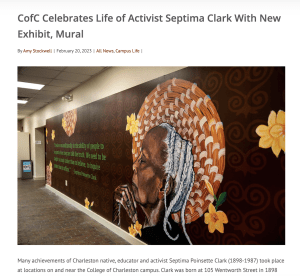
The Committee on Commemoration and Landscapes was co-chaired in 22-23 by Julia Eichelberger, Valerie Frazier, and Mari Crabtree, who all contribute to the program in Southern Studies. (Many other SOST faculty and students participate, and the CCL welcomes new members. Please contact the 23-24 co-chairs, Julia and Valerie, if you’d like to join.)
Capstone Project: Catherine Quarles ’23, who completed the Southern Studies minor in Spring 2023, was recognized at the College of Charleston Expo in April for her poster based on her Southern Studies capstone project. For this project, Catherine revisited a prior course, an independent study called “The Queer South” that studied Southern literary representations of queer identities and themes. For her capstone, Catherine designed an undergraduate course, “Queer Southern Literature,” that she would like to see taught at C of C. The course was designed to be accessible to English majors, Southern Studies minors, and any other student with an interest in the topic.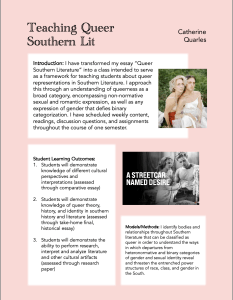
In the mock-up OAKS course that Catherine created, she wrote, “My goal in creating this class is to provide others with an understanding of how different representations of gender and sexuality have been expressed and interpreted by a range of Southern authors. Students unfamiliar with Southern culture, literature, and queer theory will be able to gain insight into queer Southern literature as a reflection of the diverse and complex history of the region. .” The course was a good reflection of Catherine’s love of Southern writers and also her experiences working with a wide range of C of C students. She served as a member of the Student Advisory Group for the English Department and worked as a Peer Facilitator for a first-year experience course on Charleston Writers.
Interpretive Training: The Southern Studies program sponsored two CCL members’ attendance at a Certified Interpretive Guide workshop at the Avery Research Center in July 2023. This was the second time this CIG Instructor, Research Archivist and Interpretation Coordinator Erica Veal, taught a course with a special focus on supporting Black and Brown interpreters.
Walking Tours: Students in Honors Southern Studies and in ENGL/SOST 241 attended a historical campus walking tour by Fanio King, Director of Marketing and Communications in the School of Humanities and Social Sciences and member of the Committee on Commemoration & Landscapes. After completing this walking tour, students provided feedback after the tour that is currently being used by the CCL in the tours they developed for F 2023. The first historic campus tours for C of C faculty were offered in August by Fanio King, Harlan Greene, and Julia Eichelberger. More will be offered this year—stay tuned!

Other SOST faculty and student accomplishments:
Tamara Butler, director of the Avery Research Center for African American History and Culture, led the Avery team that won a $2 million Mellon Grant for “the preservation and collection of the South Carolina Lowcountry’s social history.” Amidst her many forms of scholarship, leadership and service, Tamara also contributed to the Libguide, “Exploring the Indigenous South.”
Mari Crabtree, who teaches “Race, Violence, and Memory in American History” (AAST 340), completed an exhibit for the Lowcountry Digital History Initiative on the history of desegregation at the College of Charleston. She also wrote an online essay on the new “Saint Septima” mural, gave a sabbatical presentation on the ethics of historical privacy in Black studies, and discussed her recent book, My Soul Is a Witness: The Traumatic Afterlife of Lynching, at a public presentation in Spring 2023 and with Matthew Cressler on a College Today podcast.
We were sorry to say farewell to Matthew Cressler (RELS), who moved with his family to the DC area this summer. Needless to say, he’s still doing the work, publishing a new webcomic series called “Bad Catholics, Good Trouble,” about “antiracism and struggles for justice across American Catholic history.” We expect nothing less than ongoing “good trouble, necessary trouble,” from you, Matthew.
Tanner Crunelle ’20, a Southern Studies minor now completing his MFA in Poetry at the College as a Woodfin Fellow, did a poetry reading for the Poetry Society of SC in Sept 2022 and in 22-23, served as a research assistant for the SC LGBTQ+ archive.
Shannon Eaves, who teaches courses in African American history, interviewed Tiya Miles on her book All That She Carried: The Story of Ashley’s Sack for the Charleston Literary Festival in November 2022.
Program Director Julia Eichelberger (English) discussed the legacies of slavery in Southern literature with Bernard Powers on his OHM Radio program, “Black History Talks” in Sept 2023. She was a lead author of the virtual tour, “Sites of Inspiration: Septima Clark and the Civil Rights Movement, Charleston, SC” created to accompany the new exhibition honoring Clark, and the curator of a new online tour to support the College’s second annual Maroon Walk for Juneteenth.
Grayson Flowers ‘21, a Southern Studies minor, is now a project manager at Sifly Homes.
English professor and director of the 1967 Legacy scholarship and leadership program, Valerie Frazier, who teaches African American Literature (ENGL 313) and other courses that count for Southern Studies, led the ongoing work on Phase II of the Septima Clark Auditorium exhibition, which will focus on C of C and community activists and leaders whose work continues Clark’s legacy.
Joanna Gilmore (Archaeology, Musuem Studies) designed the new exhibition on Septima Clark in the Education Center and began work on Phase II of the exhibition.
Special Collections scholar-in-residence Harlan Greene published The Real Rainbow Row: Explorations in Charleston’s LGBTQ+ History. He spoke on the book at numerous venues, including a standing-room-only talk at the Charleston Library Society and full house at the Rita Hollings Auditorium on campus. The College Today featured Greene’s work on this book and the development of the SC LGBTQ+ Archive in the College’s Special Collections.
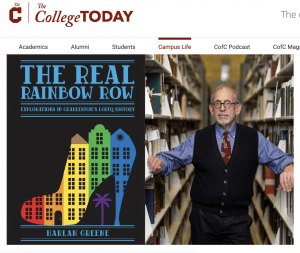
At the 2022 Charleston Literary festival, Harlan Greene interviewed Geoffrey Harpham, author of Citizenship on Catfish Row, along with soprano Alyson Cambridge, on the topic “Porgy and Bess Reassessed.”
Aaisha Haykal, director of archival services at the Avery Research Center, contributed to the CCL’s research and curating of images for the CCL’s exhibition on Septima Clark. She also wrote an essay on the Avery Research Center for the new Discovering Our Past virtual tour accompanying the Maroon Walk for Juneteenth.
The Honors College sponsored a summer institute for high school students, Mapping Memory in Charleston, taught by Dr. Jennifer Cavalli. Two more Charleston-focused summer institute courses were Saving Biodiversity in the Anthropocene, taught by Dr. Chris Freeman, and Bodies and Anti-Bodies: A Visual History of Medicine in Charleston, taught by Dr. Brooke Permenter.
Adam Jordan (EDFS), who recently co-authored an essay “Care Matters: Student Perspectives of Mental Health Determinants in an Alternative High School,” taught SOST 200 during Summer 2023.
Brennan Keegan, who teaches “Religions of Charleston” (RELS 253), published “Contemporary INative American and Indigenous Religions: State of the Field” and contributed her expertise to the development of the new Libguide, Exploring the Indigenous South.
Joseph Kelly (ENGL, IAAS) published an essay in The Conversation entitled “A brief history of the Ku Klux Klan Acts: 1870s laws to protect Black voters, ignored for decades, now being used against Trump.” He also wrote an essay for Discovering Our Past about the Civil War marker at Fort Johnson, placed there in 1961 by C of C. His essay situates this marker within a broader context of South Carolina’s legacies of slavery, Jim Crow, and the misremembering of our collective past.
Gibbs Knotts, Dean of the School of Humanities and Social Sciences, is teaching Southern Politics in Fall 2023. This year he’s published three articles in The Conversation, starting with one in February on why the Democratic Party made South Carolina the first primary in the country.
Mark Long (GEOG, Halsey), co-curator of the landmark exhibit Southbound: Photographs of and About the New South, curated a new exhibit featuring art by La Vaughn Belle, including works created in the Lowcountry.
Michele Moore, author of The Cigar Factory: A Novel of Charleston, is teaching SOST 200 this fall, along with courses in first-year writing and Medical Humanities.
Ralph Muldrow (HPCP, Art History), who regularly teaches a course that counts for Southern Studies, “Drawing Charleston” (HPCP 285), published Charleston Renaissance Man: The Architectural Legacy of Albert Simons in the Holy City.
Scott Peeples (ENGL) was interviewed on a podcast about his latest book on Edgar Allan Poe and published an essay for The Conversation, “How Edgar Allan Poe became the darling of the maligned and misunderstood.” (For more info on Poe’s relationship to the Lowcountry, read Scott’s article “Unburied Treasure: Edgar Allan Poe and the South Carolina Lowcountry.”)
Patti Ploehn ‘19, who minored in Southern Studies, is now a Historic Preservation Specialist at the Warren Lasch Conservation Center in North Charleston.
Harriet Pollack, Affiliate Professor, is heading to France in September 2023 to present in the European Southern Studies Forum Conference. She’ll discuss how the Southern writer Eudora Welty addresses the problematic history of the Southern “body politic”– the national cultural body— through the social codes written on the individual female bodies of Welty’s characters. In January 2023 her most recent book, co-edited with Jacob Agner, came out: Eudora Welty and Mystery: Hidden in Plain Sight. And she was the 2023 recipient of a Eudora Welty Review Research Grant to work at the Mississippi Department of Archives and History in their Special Collections.
History emeritus professor and director of the Center for the Study of Slavery in Charleston, Bernard Powers, published an essay in The Conversation, “International African American Museum in Charleston, SC pays new respect to the enslaved Africans who landed on its docks.” The Center for the Study of Slavery was also in the news for sponsoring the research of graduate assistant Lauren Davila, who uncovered the existence of the largest known auction of enslaved human beings in the U. S., here in Charleston. The co-sponsor of Lauren’s research, Margaret Seidler, is completing a book sharing research and reflections on her Charleston ancestor who was a trafficker in enslaved humans.
Dale Rosengarten (Special Collections) was honored by the South Carolina General Assembly with a resolution thanking her for “thirty years of exemplary service” to the state, especially her work collecting artifacts and oral histories for the College’s Jewish Heritage Collection and her research of sweetgrass basketry and her advocacy for Gullah basket sewers. Dale has also done tremendous work with the Jewish Historical Society of South Carolina, has collected invaluable oral histories of South Carolina Jewish residents, and has lead the Pearlstine/Lipov Center for Southern Jewish Culture.
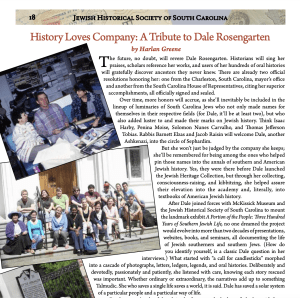
Tribute to Dale Rosengarten in Jewish Historical Society of SC’s magazine
Dale Rosengarten has created a formidable body of work that will serve Southern Studies for generations to come. Mazel tov and endless thanks to you, Dale! Here’s hoping we’ll continue to see and work with you during your well-earned retirement.
Stella Rounsefell ’19, who majored in English with a minor in Southern Studies, directed a successful summer reading camp at Butler Academy in Hartsville, SC.
Hayden Ros Smith, who teaches courses in Southern history and occasionally teaches SOST 200, recently co-authored “Emergence and Evolution of Carolina’s Colonial Cattle Economy.”
Barry Stiefel (HPCP, Urban Studies) spoke with the National Park Service for a podcast on the “Sustainability of Historic Preservation.”
Robert Stockton, who teaches “Society and Culture of Early Charleston (HIST 323), co-authored Broad Street and Beyond: Charleston’s Historic Nexus of Power with Peg Eastman.
Mary Trent (ARTH) published several articles on photography, including one on Ellen Craft, co-author of the slave narrative Running a Thousand Miles for Freedom. In Spring 2023 she moderated a public discussion with Tamara Lanier, “Should Harvard Own My Enslaved Ancestors?. . . On Repatriating Artifacts of North American Slavery.”
Jewish Studies professor Ashley Walters began directing the Pearlstine/Lipov Center for Southern Jewish Culture in Spring 2023.
Annette Watson (GEOG), who teaches “Reading the Lowcountry Landscape” (GEOG 219), directs the M. S. Program in Environmental and Sustainability Studies.
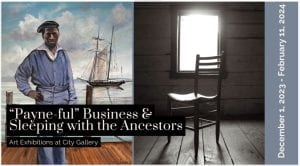







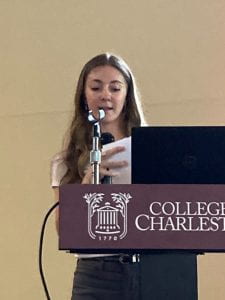

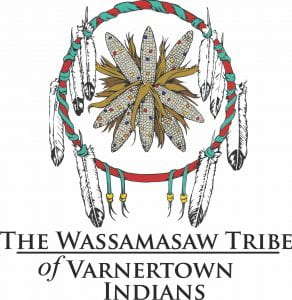
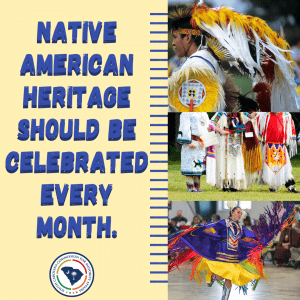
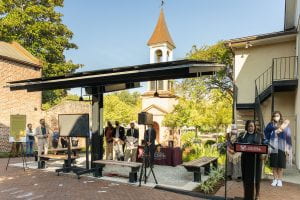
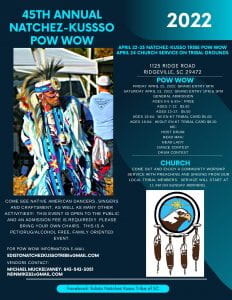
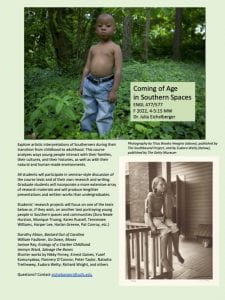 MW 4-5:15 Prof. Julia Eichelberger For permission to register contact
MW 4-5:15 Prof. Julia Eichelberger For permission to register contact  Environmental Justice Contact Dr Allison Welch
Environmental Justice Contact Dr Allison Welch 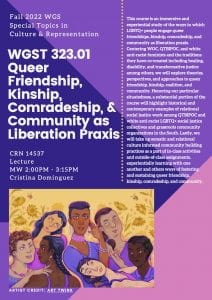 WGST 352 ST: Queer Friendship, Kinship, Comradeship, and Community as Liberation Praxis. MW 2-3:15 Prof. Cristina Domingez
WGST 352 ST: Queer Friendship, Kinship, Comradeship, and Community as Liberation Praxis. MW 2-3:15 Prof. Cristina Domingez